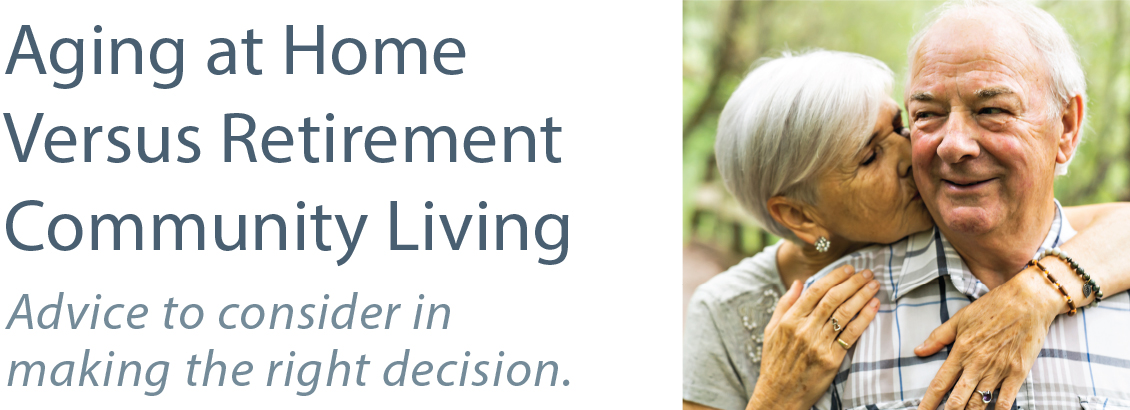Insights | Blogs

There’s no place to age like home – or is there?
Not too long ago, Nicole’s mother didn’t need daily help. She cooked for herself and even drove herself to the grocery store once a week. But that was before Nicole received the news on a phone call one chilly Monday morning. Nicole was told her mother, Lila, had fallen at the bank and broken her hip. After that, everything changed. Within a few weeks, the reversal of the parenting roles started to affect Lila. She never quite got comfortable with her daughter helping her with the most menial of tasks – like the opening of medicine bottles – or with Nicole constantly asking if Lila was okay.
That’s when Lila suggested that perhaps it would be easier if she lived in a retirement community.
The decision to move to a senior living community can be a difficult one. And not all seniors are as open to the idea as Lila. But whether your family is dealing with strained relationships, lack of time to provide care, or other challenges due to aging in place, when contemplating a retirement community you must consider factors that include you or your loved one’s safety, and quality of life.
You can assess the self-sufficiency of a senior by considering some of the following points.
- Medication management
Do they remember to take their medication at prescribed doses and times? If you aren’t sure, look for signs of mismanagement, such as change in behaviors, falls, or disorientation. Expired medication, pill bottles that are spread out in different rooms or medication that is taken at the wrong time of day are also signs that help might be needed. - Meal preparation
Can they purchase groceries, cook, and clean for themselves? Do they take that initiative? Are the meals that they choose to eat healthy and nutritious? - Safety and mobility
Do they have a realistic plan in place to summon help in case of an emergency? Are traffic patterns in their home free and clear of any clutter or trip hazards? - Personal hygiene
Can they bathe themselves, groom adequately, and launder clothes and linens? Do they take the initiative to do so without being prompted? - Transportation
Are they safe behind the wheel? Do they still have rapid responses to dangerous situations? Do they get disoriented or lost while driving in familiar areas, or seem to be having frequent accidents? - Socialization
How often do they get out of the house or engage in social activities? Are they showing any signs of depression or reclusiveness? - Scam Victim
Are they frequently making poor decisions and allowing scam artists to take advantage of them either on the phone or in person? Are they letting strangers engage them or letting them into their home? - Home management
As you look through every room in a senior’s house, do you see signs of trouble keeping up with housekeeping? Are there stains on furniture or carpets, unpleasant odors, or spoiled food in the refrigerator? Many times, if they start living in a small area around their easy chair and sleeping on the couch or in their easy chair, but they live in a large home, it could be a sign they might be ready for a smaller residence. - Financial management
Are they paying their bills on time? Do they get calls from creditors?
A comprehensive assessment may reveal hazards associated with a senior’s current situation or a serious change in their mental and physical health. It is up to you to objectively look at the environment, be realistic about the implications of what you find, and take proactive steps to work with your loved ones to ensure they remain healthy and enjoy good quality of life. And while your assessment may reveal an obvious answer, it can still be difficult to reach a decision. You can seek out the assistance of a geriatric care manager, also known as an Aging Life Care Professional, who specializes in assessing families for long-term care arrangements.
As you explore your family’s options, you are likely to discover the compelling benefits of senior community living. Some examples are:
- Transportation provided for reduced risk of accidents or becoming disoriented
- Onsite nutrition experts for better diets and tailor-made menus for residents’ specific needs
- Social opportunities, such as card games, shopping, and clubs to stay engaged and connected
- Enhanced safety with an emergency response system throughout the community and many times a full-time concierge staff at the front desk monitoring visitors.
- Improved family relationships as children can let go of their roles as primary caregivers
- New friends and less boredom, with ample opportunities to mingle and enjoy on-site and off-site entertainment
- Reduced stress of home maintenance or yard work, especially beneficial for those with physical ailments
If your family reaches the decision that a home away from home is the best option, you must be a good observer when looking for the best transition option. There are a wide range of choices, from the most basic group homes to the most high-end, luxury condo-style living. Be sure to visit as many places as you can and ask about all financial options available.
Remember, the home you choose for yourself or a loved one should fit the needs of both the senior and of the family.

About Brazos Towers:
Brazos Towers at Bayou Manor has been Houston’s most trusted non-profit retirement community since 1963. Here, seniors receive all the support services they might ever need: Independent Living, Assisted Living, Memory Care, Skilled Nursing and Rehabilitation. This environment focuses on experiencing the most freedom, interesting engagement and personal independence possible, regardless of one’s capabilities.
About the Author, Michelle Watkins:
As Retirement Counselor, Michelle helps seniors successfully navigate their choices by better understanding the differences between communities and the services they offer.
Contact her at 713-660-5033 to schedule your complimentary retirement planning consultation or email michelle.watkins@houstonretirement.org.







